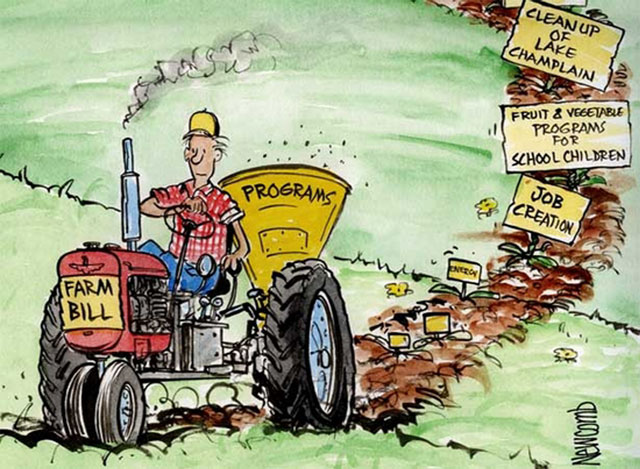The U.S. Congress recently passed the U.S. Farm Bill 2014 which contains terms causing worries to Vietnam Tra fish farmers and exporters. How should we acknowledge this problem?
Dealing with crisis and globalization
The adoption of U.S. Farm Bill 2014 by the is an inevitable consequence after extensive changes of the world economy over the past years. The process of widespread globalization has made the U.S. market an ideal destination for commodities. With various reasons, the country is still considered to be the most open market. The explosion of big agricultures in the world such as China, India is creating pressure on the U.S. agriculture. The economic downturn and the growing supply have resulted in the constantly lowering of agricultural product prices, thus making the U.S. farmers suffer from significant economic losses. Besides, the U.S. has also faced many natural disasters over the last few years.
Farm Bill 2014 was passed and the U.S. government pledged to provide more support to revive its agriculture sector. Billions of dollars will be used to help U.S. farmers overcome losses due to natural disasters and falling prices. Besides, there is also a trend (though not specifically shown) that the U.S. government will give more stringent policies to tighten import of farm products. This process will filter out products that have low quality, too low prices and those with unknown origin. As a result, the U.S. market will open conditionally with imports.

Source: Dailykos.com
The passed bill is generally supported by farmers. However, a lot of views which are mostly from the U.S. Institutes worry about deep intervention by the government into the market and increase of the Government’s protection affects not only the freedom of the market but also many farmers across the world who rely on the U.S. market.
Obsession to exporters
The bill received many different reactions in Vietnam. The positive side said that the implementation of the bill terms is inevitable.
In fact, the traceability and consistency in aquaculture production process is nothing new. Even popular raising trends for export in the world over the past few years have asserted this process in the globalization, to ensure that low quality products cannot access to supermarkets and consumers.
Many businesses said that the standards for aquaculture have been applied by many Vietnam businesses, and the bill is not a negative barrier imposed on Vietnamese exporters.
A number of other businesses thought that the bill will be a big barrier to seafood, especially to Vietnam’s Tra fish.
Vietnam’s Tra fish market share in the U.S. has increased from 37 percent to 76 percent over the last five years; while the U.S. domestic catfish production has fell by 40 percent. Since it is difficult to reduce the raising costs in the country, the U.S. agriculture is likely to apply technical barriers. For example, if Vietnamese farmers are forced to raise Tra fish in accordance with the process of raising catfish in the U.S. the price of Vietnam’s Tra fish will increase and that makes the competition with Vietnam easier for the U.S. side. This raises the concern that the differences in natural conditions, aquaculture habits and culture of two countries may lead to Vietnamese farms being unable to meet the model of American farms, and hence fishery farmers will have to “suspend their ponds”.
Challenge is also an opportunity
If we impose an negative insight on the bill, it is probably not appropriate as the bill was passed with the aim of helping recover the U.S. agriculture and it is applied to every importer, not just those from Vietnam, and if Vietnam meets difficulties, other competitors do, too.
If Vietnam can confirm its reputation with the U.S. agriculture, the bill can solve all problems and create easy environment for dialogue rather than confrontation between the two countries’ agricultural sectors as in the past.
In fact, it is only predicted whether the import restrictions or technical barriers imposition occurs or not and to what extent, because it needs to have more detailed regulations for seafood products, after that we can know the impacts of the bill to Vietnam’s sprearhead items.
Experts said that, if considering in line with the positive side, the bill is an opportunity for Vietnam’s fisheries industry to change in the direction of modernization.
According to a director of an aquaculture company, in the past we had only tens of Tra fish raising companies, now the figure has increased many times. The market becomes fragmented, companies are not eligible to invest (due to narrowing area and falling yield, less profit than before). Without mentioning the competition to buy and sell between businesses, there is still the situation of unknown-origin products. Especially, the export market is dominated by Chinese importers recently. Processing companies use materials from foreign countries, and that causes serious losses for the prestige of Vietnam’s aquatic products seriously. Who dares to guarantee that food from Vietnam originated from Vietnam? About the U.S. agricultural sector, if they apply the regulations of origin and consistent requirements in raising process for products from Vietnam, Vietnamese businesses will be forced to create high-quality products.
Some other businesses revealed that under the pressure of the U.S. market, many Vietnamese exporters have eyed less demanding markets such as China. This move is not considered a positive trend because among the modern raising and production standards applied by the U.S. and the EU, apart from ensuring quality and protecting environment, the standards are also connected to living standard of farmers. Meanwhile, issues related to environment, quality of products and farmers’ rights are big in China.
| >> The U.S. Farm Bill 2014 is a challenge for small-scale and backward businesses and raising areas due to the lack of investment. However, it is not a new problem and too big for those who have accessed to modern standards of the world, which Vietnam’s agricultural sector is also making every effort to build. |